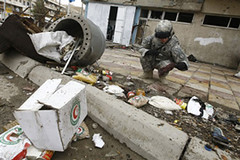
Aftermath of another bloody and violent day in occupied Iraq. At least 73 people were killed in explosions on April 23, 2009.
Originally uploaded by Pan-African News Wire File Photos
16:43 Mecca time, 13:43 GMT
Scores dead in Iraq suicide blasts
At least 73 people have been killed in two separate suicide attacks in Iraq, police say.
One bomber detonated his explosives in Baghdad, killing 28 people, while the other targeted Iranian pilgrims north of the Iraqi capital, leaving 45 dead.
The blast in central Baghdad took place as a group of policemen were distributing relief supplies to Iraqis who had been driven from their homes during the sectarian bloodshed that followed the 2003 US-led invasion.
Fifty people were wounded and at least five children were among the dead, police said.
"It is a suicide bomber. Obviously that has the fingerprints of al-Qaeda," Major-General Qassim Moussawi, a Baghdad security spokesman, said.
A medic at the nearby Ibn al-Nafis hospital said that five children and a woman were confirmed dead at the hospital.
Pilgrims targeted
The second attack occurred near Muqdadiya, 80km from Baghdad, in the northeastern province of Diyala.
The suicide bomber appeared to have targeted a group of Iranian pilgrims in a restaurant.
Most of the 45 dead were believed to be Iranians visiting Shia Muslim religious sites in Iraq, police said. Sixty-three people were wounded.
The attacks were the latest in a series of bombings that have raised fears of a surge in violence as the US military plans for a full withdrawal by the end of 2011.
Security has improved measurably in Iraq over the past two years, but attacks targeting the police are still common in some parts of the country, including the capital.
Al-Qaeda arrest
In another development, Abu Omar al-Baghdadi, the purported leader of the Islamic State of Iraq, an al-Qaeda-linked group, was captured.
Iraqi state television said al-Baghdadi was arrested in eastern Baghdad.
Security experts have previously speculated that al-Baghdadi was a character invented by some extremist groups rather than a real person.
The group is one of a handful of Sunni Arab groups blamed for suicide bombings and other attacks in the northern city of Mosul and other parts of Iraq.
Source: Agencies
Suicide bombs kill scores in Iraq
Scores of people have been killed in two suicide bombings in Iraq.
At least 48 people, mostly Iranian pilgrims, died when a suicide bomber blew up a restaurant in Baquba, in the north-east, officials say.
In Baghdad, a suicide bomber killed at least 28 people - detonating a belt of explosives as police distributed aid to a crowd of homeless families.
Violence has fallen sharply in the last year but insurgents continue to carry out attacks across Iraq.
The deaths in Baquba, Diyala province, happened when a suicide bomber struck a roadside restaurant packed with Iranian pilgrims, military officials said.
About 63 people were also injured, and the restaurant demolished. Of the dead, only two were not Iranian, Reuters news agency reported.
The BBC's Jim Muir in Baghdad says if the Baquba casualty figures are confirmed, this will be the deadliest such attack this year.
Diyala has remained one of the two main areas of Iraq which have defied all efforts to bring them under control, our correspondent says.
Officials in Baghdad said the suicide bomber there infiltrated the crowd of displaced families as they received supplies from police in a square near the city centre.
The people had been made homeless by the sectarian conflict which erupted following the 2003 US-led invasion of Iraq.
At least five children were among the dead and more than 50 people were wounded, police say.
One man, injured by shrapnel from the blast, said a fire erupted as he waited for a bus.
Issam Salim, 35, told Associated Press news agency: "I turned around as I fell to the ground and saw a big fire break out with black smoke.
"Women and children are crying from pain beside me in the hospital. Some of them suffered burns."
'Arrest' investigated
Meanwhile, Iraqi media quoted security officials saying they had arrested Abu Omar al-Baghdadi, the purported leader of the Sunni Arab group the Islamic State in Iraq.
However, defence ministry spokesman Maj Gen Mohammed al Askari told the BBC "we're not sure" when asked about the arrest.
DNA and other investigations had yet to establish the identity of the man arrested, the BBC was told.
In Washington, a Pentagon spokesman said the US military was investigating the arrest claim, AP reported.
On Wednesday, the US Department of Defence's top Middle East adviser said insurgent attacks would probably increase as US forces started to leave, but added that there was no plan to delay troop departures.
US President Barack Obama says the Pentagon will withdraw all but 35,000 to 50,000 troops from Iraq by the end of August 2010.
A joint security agreement requires all US troops to be out of Iraq by the end of 2011.
Story from BBC NEWS:
http://news.bbc.co.uk/go/pr/fr//1/hi/world/middle_east/8014390.stm
Published: 2009/04/23 16:57:51 GMT
No comments:
Post a Comment